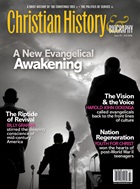Speaking to a large group of evangelical pastors in the mid-l940s, Carl F. H. Henry, soon to become a founding faculty member at Fuller Seminary, questioned them about the place of social concerns in their preaching. As he tells the story in the opening pages of his 1947 book, The Uneasy Conscience of Modern Fundamentalism, he asked them: "How many of you, during the past six months, have preached a sermon devoted in large part to a condemnation of such social evils as aggressive warfare, racial hatred and intolerance, the liquor traffic, exploitation of labor or management, or the like—a sermon containing not merely an incidental or illustrative reference, but directed mainly against such evils and proposing the framework in which you think solution is possible?"
Henry was chagrined when "[n]ot a single hand was raised in response." But he was not really surprised. He knew that inattention to such matters was a general characteristic of the evangelicalism of his day. He also knew, however, that this pattern was out of step with the mainstream evangelical tradition. "For the first protracted period in its history," he observed, "evangelical Christianity stands divorced from the great social reform movements."
Ten years later, evangelical historian Timothy Smith was to document this situation in detail in his Revivalism and Social Reform, showing that the pre-Civil War Holiness movement had actively participated in the abolitionist cause, as well as the campaigns for woman suffrage and temperance. In a "great reversal" (Smith's term), evangelicals retreated from these reformist efforts around the turn of the century, fostering instead a social pessimism and an almost exclusive focus on evangelism and individual piety.
For Henry, Ockenga, and others, this was an unfortunate over-reaction against liberal theologians who, drawing on the "social gospel" movement of the early 20th century, tended to identify the Christian message almost exclusively with a social-economic agenda. Henry and others were now calling for a comprehensive revitalization of the evangelical witness that would include serious efforts at social reform.
For all of the energy that Henry and others put into this revitalization, however, they did little to address the practical social ills that Henry had listed in 1947. This continuing failure was due to several factors. Most significant was the fact that Henry and his closest allies were scholars, and their natural inclination was not to take to the streets but to give sustained attention to correcting what they saw as the theological defects of the evangelical movement of their day.
In addition, they were worried not only about social inactivism but also about the image of evangelicals as anti-intellectual. So they expended much effort on intellectual renewal, working especially on remedying widespread evangelical cultural pessimism. They were convinced that recent evangelicalism had placed too much of an emphasis on a future millennial Kingdom, ignoring the possibility of important Kingdom gains in the present.
The solution was not, they argued, to conform to a liberal social gospel agenda, but rather to develop a more comprehensive, biblically faithful perspective. They wanted a theological perspective that did not abandon the classical evangelical themes of individual fallenness and the need for personal redemption, but would also address global realities in a way that clearly exposed the errors of those who trusted in an evolving humankind's capacity for self-improvement. The New Evangelicals gave major attention to developing a "new apologetics" (a major theme in Fuller Seminary's early days), a theology of culture, and a view of God's work in history that allowed for partial successes in reformist efforts prior to the return of Christ.
On the defensive
But the newly "progressive" evangelicals also experienced pressure from a virulent anti-communism that emerged in the 1950s. Carl McIntire, Billy James Hargis, and the members of the John Birch Society (founded in 1958) not only accused liberal Protestant leaders of Marxist sympathies, they also monitored statements of evangelical leaders, looking for hints of support for "socialist" causes. This often put Henry and others on the defensive, forcing them to regularly demonstrate their biblical orthodoxy—and creating a reluctance to proclaim too boldly on matters that might leave them open to charges of social gospel sympathies.
This reluctance was clearly on display during Henry's editorship of Christianity Today from 1956 through 1968. The magazine frequently expressed misgivings about the tactics of the civil rights movement, as well as voicing strong support for the Vietnam War. Most significantly, Henry himself came to espouse a perspective on the role of the church in social matters that seemed to conflict with his previous calls for more political preaching.
While he always allowed that there were moments in history when social "emergencies" (Nazi Germany was an obvious case in point) necessitated official church pronouncements, Henry argued that the church has neither the "competence" nor the "authority" to pronounce on social specifics. The task of preaching, he insisted, was to offer general guidelines for faithful discipleship; the business of applying these guidelines to specific social situations was to be left to the individual.
In short, while the New Evangelical leaders had proclaimed, in the 1940s, the need for a new evangelical activism, very little practical involvement resulted from the social agenda they had set forth. As the '70s dawned, liberal Protestants and Roman Catholics still depicted evangelicalism as a movement given to "other-worldly" concerns.
A new generation of activists
This is not to say, however, that the urgings to action of the immediate post-World War II period came to nothing. The probings of Henry and others had brought about a significant theological renewal, albeit one whose practical outworkings had to wait for others to implement. And the implementation did begin to happen in a serious manner in the 1970s when a very visible evangelical activism emerged, led by a younger generation who had been energized by the civil rights and anti-war movements.
In 1971, a small group of students at Trinity Evangelical Divinity School led by Jim Wallis, a onetime "New Left" activist who had returned to his evangelical roots, established a magazine of "radical Christian" support for various social causes. The magazine was later called Sojourners, but its original title was Post-American to symbolize—in a time when many were proclaiming that the United States had become "post-Christian"—the need for evangelicals to foster a "post-American Christianity."
While the young activists clearly were espousing causes that did not always sit well with what were now the older generation of New Evangelicals, representatives of the two groups did manage to speak, on at least one occasion, with a common voice. In 1973, they gathered for a long weekend in Chicago to hammer together "The Chicago Declaration of Evangelical Social Concern."
Signed by, among others, Wallis, Henry, Vernon Grounds (the president of Denver's Conservative Baptist Seminary), Senator Mark Hatfield, the National Black Evangelical Association's William Bentley, faculty members from Wheaton College, Calvin College, and Fuller Seminary, and leaders of the Christian feminist Daughters of Sarah, the document received national publicity. Time magazine's Richard Ostling observed that this was likely the first time in the 20th century when 40 evangelical leaders got together for a whole weekend to discuss issues of social concern.
The Declaration addressed a number of topics (e.g., gender concerns and environmental issues) that went well beyond the causes to which Henry and others had pointed in 1947, and those present were aware that not all of the older leaders were enthusiastic about each of the topics treated. But the rough continuities with the 1940s were symbolized nicely in the fact that one of the signatories was Carl Henry's son, Paul, who had recently joined the political science department at Calvin College after serving as a Peace Corps volunteer. Paul Henry, who led a small anti-war caucus in the Michigan delegation to the 1972 Republican National Convention, went on to serve four terms in Congress.
The new evangelical activism received additional national attention when Jimmy Carter, campaigning for the presidency in 1976, identified himself as an evangelical. Newsweek magazine's cover story declared 1976 "The Year of the Evangelical." A very different sort of activism made its appearance when the New Religious Right became a political force in the '80s. With a leadership drawn largely from the Baptist Bible belt, this movement has displayed characteristics that run counter to the spirit of the 1940s plea for modest reformist efforts based on careful theological reflection. But in a larger sense, the impulse for all of the evangelical activist programs from the mid-20th century onward can be traced back to the New Evangelicals' original call for a corrective to the "uneasy conscience."
Richard J. Mouw is president and professor of Christian philosophy at Fuller Theological Seminary.
Copyright © 2006 by the author or Christianity Today/Christian History & Biography magazine.
Click here for reprint information on Christian History & Biography.

Support Our Work
Subscribe to CT for less than $4.25/month





























